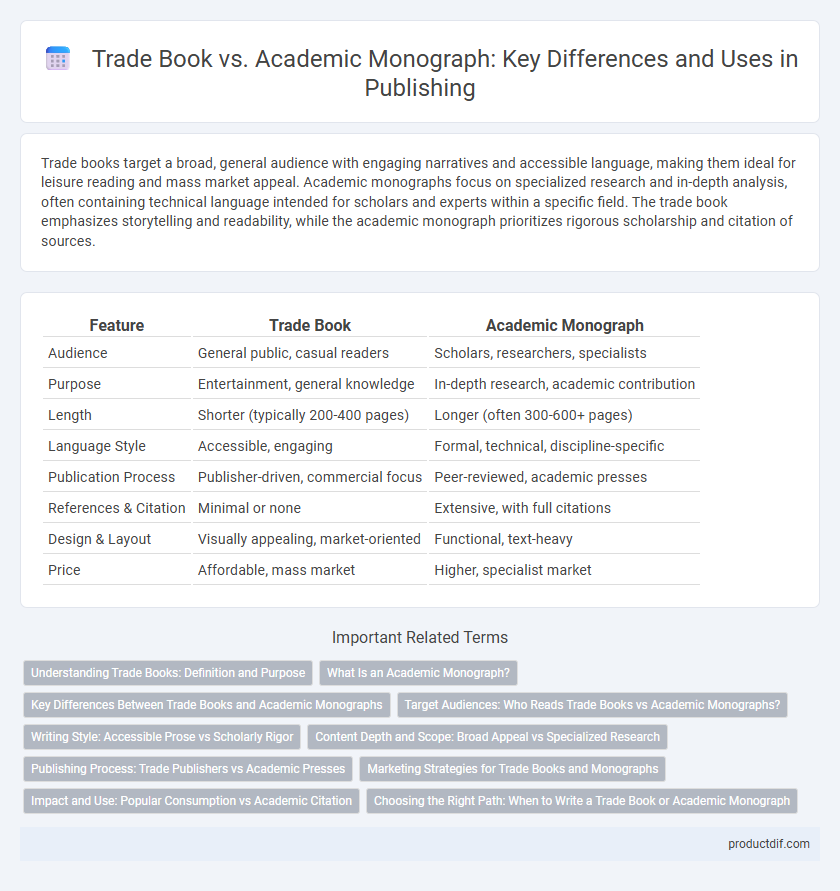Trade books target a broad, general audience with engaging narratives and accessible language, making them ideal for leisure reading and mass market appeal. Academic monographs focus on specialized research and in-depth analysis, often containing technical language intended for scholars and experts within a specific field. The trade book emphasizes storytelling and readability, while the academic monograph prioritizes rigorous scholarship and citation of sources.
Table of Comparison
| Feature | Trade Book | Academic Monograph |
|---|---|---|
| Audience | General public, casual readers | Scholars, researchers, specialists |
| Purpose | Entertainment, general knowledge | In-depth research, academic contribution |
| Length | Shorter (typically 200-400 pages) | Longer (often 300-600+ pages) |
| Language Style | Accessible, engaging | Formal, technical, discipline-specific |
| Publication Process | Publisher-driven, commercial focus | Peer-reviewed, academic presses |
| References & Citation | Minimal or none | Extensive, with full citations |
| Design & Layout | Visually appealing, market-oriented | Functional, text-heavy |
| Price | Affordable, mass market | Higher, specialist market |
Understanding Trade Books: Definition and Purpose
Trade books, primarily aimed at general audiences, cover a wide range of topics including fiction, nonfiction, and popular science, designed to entertain or inform. Their main purpose is to reach broad markets through retail sales, emphasizing accessibility and readability over scholarly depth. Unlike academic monographs, trade books prioritize engaging storytelling and market appeal rather than extensive original research or specialized knowledge.
What Is an Academic Monograph?
An academic monograph is a specialized, in-depth scholarly book typically written by a single author or a small group of experts, aimed at advancing knowledge within a specific field. Unlike trade books, which target general readers and prioritize accessibility and broad appeal, academic monographs emphasize rigorous research, detailed analysis, and are often published by university presses or academic publishers. These works contribute to academic discourse and are essential resources for researchers, scholars, and students seeking comprehensive, authoritative information on niche subjects.
Key Differences Between Trade Books and Academic Monographs
Trade books target general audiences with accessible language and broad topics, emphasizing readability and entertainment. Academic monographs focus on specialized research, detailed analysis, and contribute to scholarly discourse, often including extensive citations and rigorous methodology. The publishing process for trade books prioritizes market appeal and faster production, while academic monographs undergo peer review and are published primarily for educational and professional purposes.
Target Audiences: Who Reads Trade Books vs Academic Monographs?
Trade books primarily target general readers seeking entertainment, practical information, or popular knowledge, appealing to a broad audience with accessible language and engaging content. Academic monographs cater to scholars, researchers, and students within specific disciplines, emphasizing in-depth analysis, extensive citations, and specialized terminology. The distinct target audiences influence the writing style, purpose, and distribution channels of trade books versus academic monographs.
Writing Style: Accessible Prose vs Scholarly Rigor
Trade books employ accessible prose designed for a broad audience, emphasizing clear, engaging narratives that prioritize readability over technical detail. Academic monographs prioritize scholarly rigor, featuring specialized vocabulary, extensive citations, and methodical argumentation intended for experts and researchers. This contrast in writing style reflects their distinct purposes: trade books aim to inform or entertain general readers, while academic monographs contribute to scholarly discourse with in-depth analysis.
Content Depth and Scope: Broad Appeal vs Specialized Research
Trade books offer broad appeal by covering topics with accessible language and engaging narratives designed for general audiences, while academic monographs provide in-depth, specialized research targeting scholars and experts in specific fields. Trade books prioritize readability and wide dissemination of ideas, whereas academic monographs emphasize detailed analysis, extensive citations, and original contributions to knowledge. The scope of trade books often spans multiple disciplines or popular themes, contrasting with the narrow, focused subject matter of academic monographs.
Publishing Process: Trade Publishers vs Academic Presses
Trade books undergo a streamlined publishing process aimed at wide market appeal, involving extensive marketing, design, and distribution through retail channels. Academic monographs follow a rigorous peer-review process managed by academic presses, prioritizing scholarly accuracy and often facing longer publication timelines. Trade publishers focus on commercial viability, whereas academic presses emphasize intellectual contribution and institutional credibility.
Marketing Strategies for Trade Books and Monographs
Trade books employ broad marketing strategies targeting general readers through mass media, social media campaigns, author tours, and bookstore placements, emphasizing accessibility and entertainment value. Academic monographs utilize niche marketing approaches, focusing on scholarly conferences, university presses, specialized databases, and direct outreach to academic professionals to highlight research significance and credibility. Publishers prioritize audience segmentation and promotional channels to maximize visibility and sales efficacy for trade books versus academic monographs.
Impact and Use: Popular Consumption vs Academic Citation
Trade books prioritize broad popular consumption, reaching a wide audience through accessible language and engaging narratives that stimulate general interest and cultural impact. Academic monographs target specialist readers, emphasizing rigorous research and detailed analysis that drive scholarly citation and advance academic discourse within specific fields. The impact of trade books lies in mass influence and public engagement, whereas monographs are measured by their contribution to research and citation metrics in academia.
Choosing the Right Path: When to Write a Trade Book or Academic Monograph
Trade books target a broad audience with accessible language and engaging narratives, ideal for authors aiming to influence public discourse or share practical knowledge. Academic monographs, characterized by rigorous research and comprehensive analysis, are suited for scholars seeking to advance expertise within specialized fields. Selecting between these paths depends on goals such as reaching wide readership versus contributing to scholarly debate and tenure credentials.
Trade Book vs Academic Monograph Infographic

 productdif.com
productdif.com